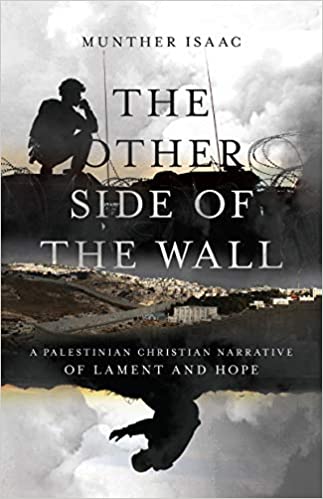The Other Side of the Wall. A Palestinian Christian Narrative of Lament and Hope.
Munther Isaac
Illinois: Inter-varsity Press, 2020
<Buying via this Amazon Link will donate 5% of the price to JMECA>
Review by: Rev John Angle, Treasurer, St George's College Trust
 This book is primarily the record of a personal journey seeking answers to the struggles, pain and questioning of one Palestinian, Rev Dr Munther Isaac, on behalf of the Palestinian people and particularly of his sisters and brothers in Christ who live in the land they call their home. The book is a deeply moving invitation to step into the shoes of countless Palestinians, both those living in Palestine and in the diaspora. It seeks to bring a better understanding of their experiences throughout history, particularly the last seventy years, and their 2000-year-old Christian faith. The book is primarily directed at American evangelicals but is a powerful message to Christians of all theological persuasions worldwide.
This book is primarily the record of a personal journey seeking answers to the struggles, pain and questioning of one Palestinian, Rev Dr Munther Isaac, on behalf of the Palestinian people and particularly of his sisters and brothers in Christ who live in the land they call their home. The book is a deeply moving invitation to step into the shoes of countless Palestinians, both those living in Palestine and in the diaspora. It seeks to bring a better understanding of their experiences throughout history, particularly the last seventy years, and their 2000-year-old Christian faith. The book is primarily directed at American evangelicals but is a powerful message to Christians of all theological persuasions worldwide.
But this is no autobiographical emotional lament or complaint from a victim of injustice and oppression, although his feelings, his pain and his ‘heart response’ shout eloquently through the pages of the book. Isaac writes with clarity and academic theological integrity with a well-researched approach to some of the vital issues impinging on the Palestinian situation, focussing his attention primarily on the evangelical church in the USA and its politicised Christian Zionism.
The first part of the book gives the reader an invitation to look, to hear and to feel what it is like for a Palestinian to live on ‘the other side of the wall’. ‘Daddy, why did they stop us yet allow the other car to pass?’ (p.19) - asked Isaac’s seven-year-old son when the family were sent back at the checkpoint on the way to Jerusalem. But there are deeper questions of identity, of nationality and injustice which are a challenge to Palestinians. A whole chapter deals with the questions of why Palestinians are ignored, silenced, discredited and dehumanized. This section concludes with the biblical story of the Canaanite woman (Matthew 15) and how it reminds us that God is a God of justice, ‘who does not discriminate based on gender, religion, race, class, or nationality’ but, ‘is in solidarity with the ones “on the other side of the wall”’ (p.46).
Isaac makes it clear that Christian Zionism, which feels very much at home within the American theological context, does not seem to be concerned about justice. He also argues that it would appear that international law is rendered irrelevant and, ‘is trumped by another higher authority: Christian Zionism!’ (p.54). He brings the situation in the land up to date discussing proposals for annexation, the US Embassy being established in Jerusalem, the spread of settlements, the continuing Nakba and particularly the tragedy of Gaza. He gives an itemised history of the way Israel has ignored international law and UN resolutions – all with the backing of a politically orientated Christian Zionism.
For Palestinians the Holy Land is their homeland, the ‘land of our ancestors’ (p.72), says Isaac. He states with confidence that the land does not belong to any people, nation, ethnicity or religion. It belongs to God. The land he says, ‘is not a free gift with no strings attached’ (p.79). Promises to Abraham, Old Testament prophecies and the negative connotations of trying to confine academic thinking into different theological boxes (eg incorporation theology, replacement theology, covenant theology etc) are all carefully analysed. He concludes with a strong appeal to all Christians to accept the centrality of Christ.
The book practically and theologically then focuses on the Parable of the Good Samaritan and the Beatitudes. Discussion, Isaac says, ‘needs to take place within the framework of ethics and morality, rather than that of eschatology or prophecy interpretation’ (p.100). Isaac says that, ‘the goal in itself is not ending the occupation but rather reconciliation’ (p.142). This is the primary expression of Jesus’ teaching to ‘love my neighbour’. He admits it is a difficult commandment to accept and understand within the context of life in the West Bank but resisting the occupation must be within the framework of love, not revenge. Similarly love for Muslims, as well as Jews, must be the lifestyle that breaks down division and suspicion. Following and obeying the revolutionary teaching of Jesus so eloquently expressed in the Sermon on the Mount is paramount. Isaac seeks to encourage us to look constantly through the lens of Christ’s mandate to be peacemakers and agents of God’s kingdom of justice and love. This book laments, it grieves; these feelings come through strongly but these are, says Isaac, ‘the first steps toward change’ (p.193), towards the realisation of hope. He quotes a colleague and friend, Yohanna Katanacho who at a recent conference at Bethlehem Bible College shared a powerful and imaginative dream (pp.200-201). I remember listening to this lecture when this dream was shared and being moved to tears of hopeful anticipation for my Palestinian friends.
This book gives further impetus to make Palestinian dreams become a reality. It is a ‘must read’ for anyone who desires to see peace, reconciliation and justice in the Holy Land, a place where Israelis and Palestinians can live together in harmony and security and where walls that divide can become history.
